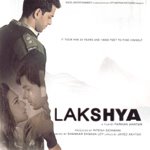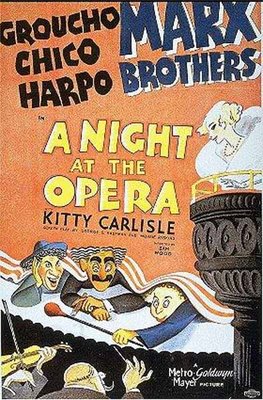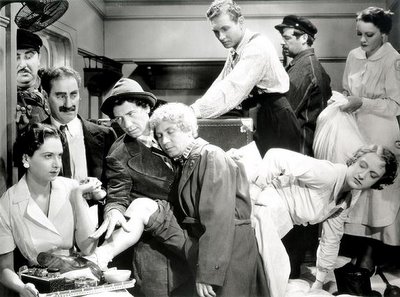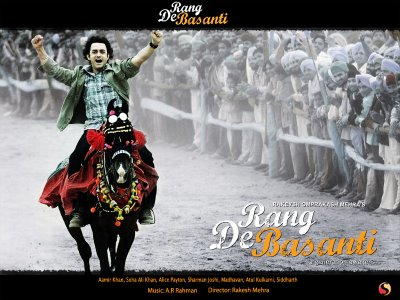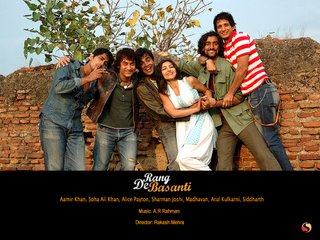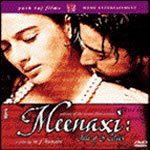His Dil Chahta Hain had created ripples in the Indian film industry, with an unusual script and an even more unusual plot. Some will question that what did the movie have? Others will say everything! Dil Chahta Hain contained in itself all the aspects of a typical hindi film, but it was so differently told that you were not bothered to make any connections. You just enjoyed it in its wholeness.
Farhan Akhtar, the golden boy of the Indian film industry disappeared after that. He was said to be looking for something completely different from his earlier offering, perhaps to show the audiences that he could handle different genres in the same medium. He was so hell bent on producing a stark variation that his father, Javed Akhtar came out of his screen-writing retirement to pen a war story for him, a story of war that had been shown many times before on Indian celluloid, but perhaps seldom potrayed to realistic perfection.
The story of Lakshya, the movie that was finally made is indeed very simple. The Kargil war of 1999 that it dealt with was incidental. It was never a war movie; it was a humanistic movie of an aimless individual who finally finds his 'lakshya' or aim in life. Progressing through a partial flashback from the present, Lakshya unfolds before us the life of Karan Shergill (Hrithik Roshan), aimless and confused. He wants to do everything, yet is too lazy to even put on his hot water apparatus to have a bath. Then comes a friend who has hopes of joining a 'dashing' Indian army. Karan immediately applies and is even asked to appear for the test. An irrate father (Boman Irani) is furious. Ego clashes appear and Karan bounces into the Army!
Now, everyone knows that the army is not a adventure zone and you can make that out when Karan escapes from the IMA. Romila (Priety Zinta) is absolutely crestfallen on hearing that and leaves him for good. What then changes him, as the screenplay tells us, is not consciousness, but again, his ego. It hurts him when she leaves him, he is humiliated. An interesting thing to be noted in this regard, is the dual perception of the word ego. Earlier, it was an ego which forced him to sit for the IMA exam because his father was furious. Now his ego deciphers the difference between his past and his future, his general incapability to take oncourse to a path his has chosen and a mission to go the full journey.
Brilliantly told and shown, Lakshya tells the story of a boy into a man, a man who knows what he is to do and how to do it and in a nutshell, do it. Farhan Akhtar consolidates his position as the Indian film industy's new powerhouse by perhaps (and this is only my view) surpassing his earlier Dil Chahta Hain. That movie was just a sequence of events, this is a message. Javed Akhtar cannot be talked of as a subsidiary in this article. His screenplay and dialogues leaves you spellbound. Take for instance the scene where Karan is taken to the border for the first time. He sees the Pakistani checkpost and exclaims that he always knew that he was an Indian, but this was the first time that he actually felt it. Absolutely stunning, it replaces with realism the utopian principle of a globe without borders. He brings out moments and characters that we can connect with, including the protagnist, Karan Shergill.
Speaking of whom, Hrithik Roshan absolutely delivers to the T. He too replaces his dancing image with an image who can portay anything. In Lakshya he plays a character, rather than the usual Hindi film conception of 'being yourself'. Karan is everything that Hrithik is not and that is what makes the character real and believable. You laugh at his earlier antics and you stand up and applaud, perhaps even cry, with Karan hoisting the indian flag on the peak. That speaks of Hrithik Roshan, actor and superstar.
Priety Zinta too matches up to Hrithik in perhaps the only half-baked character in the film. Her hairstlyles change, but she remains Romila Dutt right to the very end. She complements Hrithik throughout the movie, even in scenes that she is missing from, thereby playing the role of the significant other. Amitabh Bachchan looks like the about-to-retire CO, but his performance cannot be faulted. His eyes contain the misery that he must have seen over the years, in different wars and yet they flash genuine moments of bravado in his outfit's capabilities and his stigma. Hardly could anyone else do justice to Colonel Sunil Damle.
On the technical front, Christopher Popp's cinematography, his choice of angles and stock usage takes you into the world of the characters and potrays the various stages that they go through. This is perhaps one of the few moments in Indian cinema where you are transported into the world of the characters. Shankar-Ehsaan-Loy score songs that stand out even in seclusion from the screen and the background score haunts like that of perhaps Vangelis or Theodarkis. The simple and monotonous scores keep coming back to make you feel the rush of blood through your veins.
In all the movie is a remarkable effort at signifying its message. And like the message it contains, it goes all out to reach its destination. Mission Accomplished.
